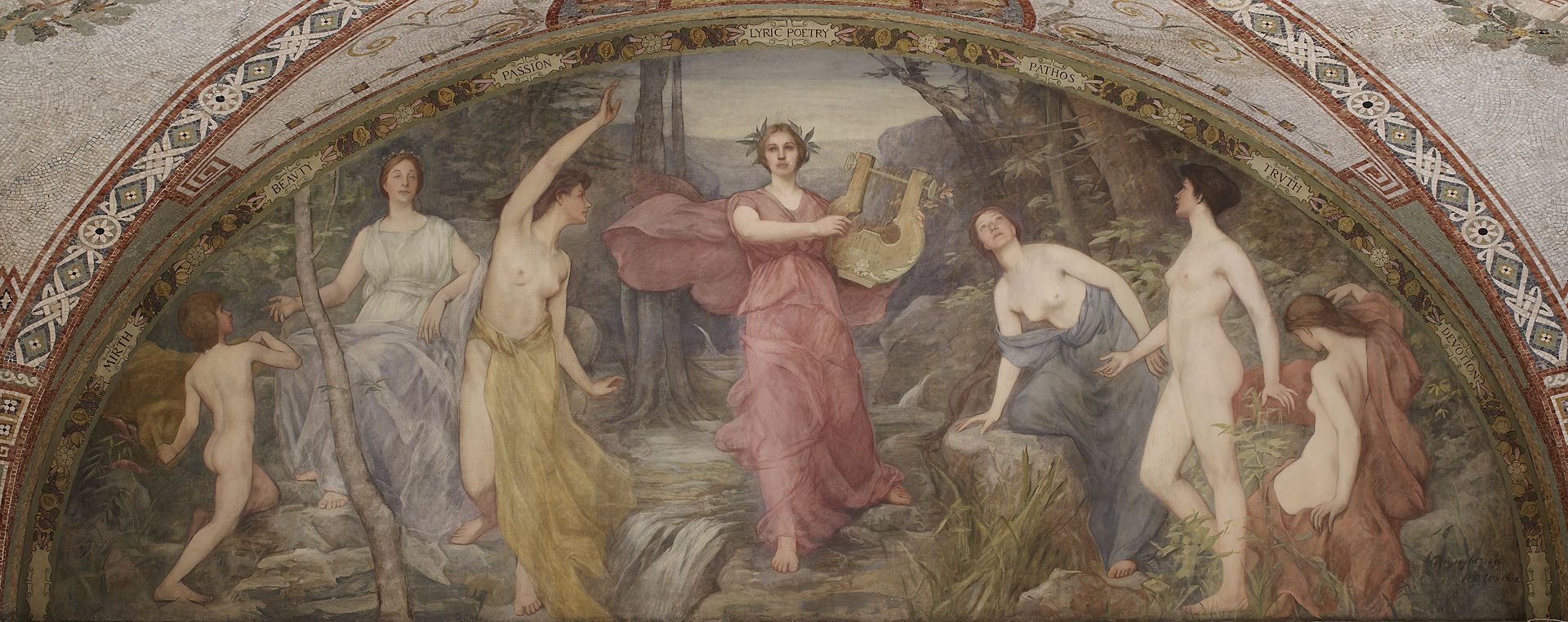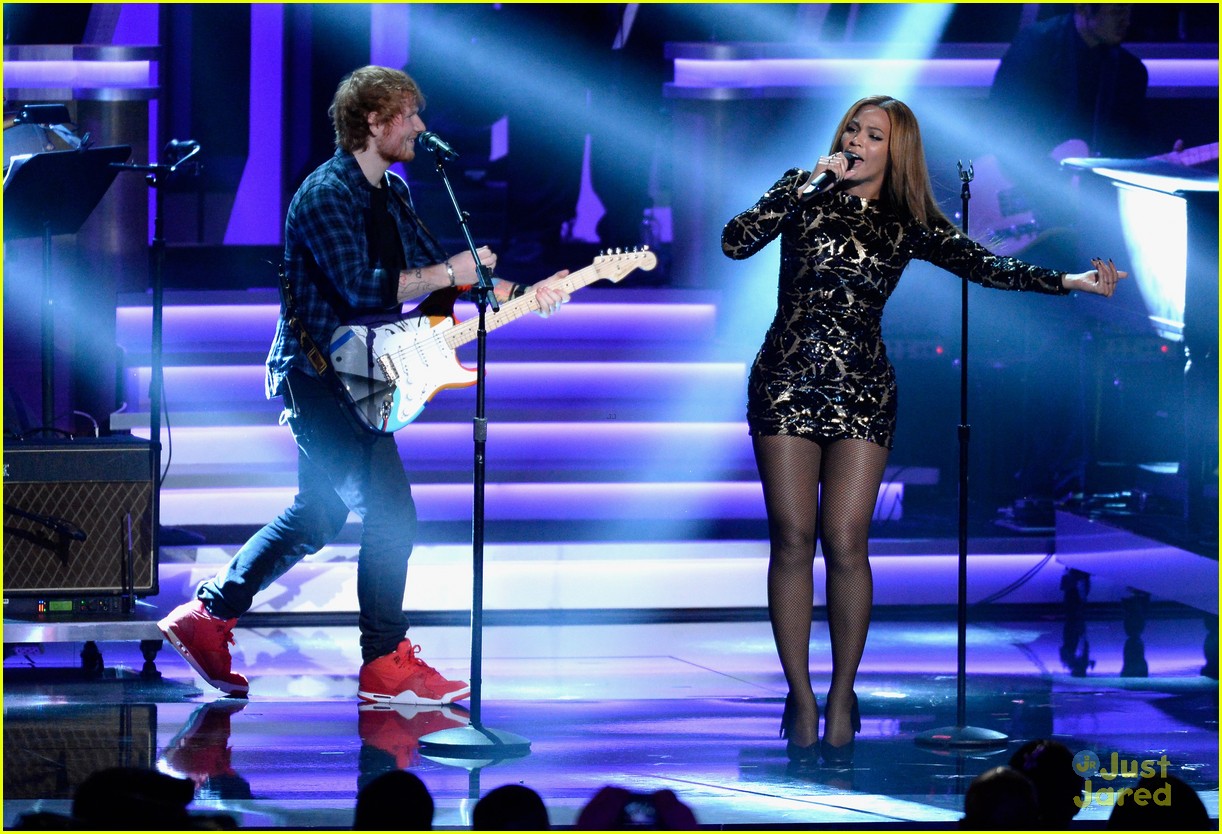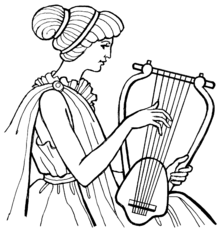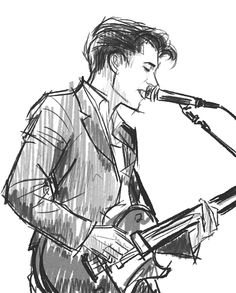 |
Craig White's Literature Courses Lyric Poem (i.e., what most people mean when they say "poetry")
|
woman playing a lyre [ > lyric], a
stringed instrument |
"Lyric poetry" describes the type or genre of poetry most people mean when they say "a poem" or "poetry." As with all genres, the characteristics defining lyric poetry vary according to media, context, individual creativity, and audience expectations.
In popular culture, the easiest analogies
to lyric poems are popular songs:
![]() rock-&-roll ballad
rock-&-roll ballad
![]() rhythm and
blues soul ballad
rhythm and
blues soul ballad
![]() country-&-western loving-and-losing, drinking-and-fighting song
country-&-western loving-and-losing, drinking-and-fighting song
![]() emo lament
emo lament
![]() a hip-hop track.
a hip-hop track.
The words to all such popular songs are still
known as "the lyrics."
Other examples of lyric poetry in popular culture or common human life include lullabyes, jump-rope rhymes, advertising jingles.
Before reading and writing became widespread, lyric poetry was not written and read but remembered and sung to the accompaniment of a lyre (illustration above) or other such instruments. Today, poetry may often be read aloud in poetry slams or poetry readings.
As a formal genre, lyric poetry is usually a single-voiced genre in which one voice speaks directly to an audience, in contrast to drama / dialogue and fiction, but genres are rarely pure, so stylistic elements associated with drama or fiction may appear in lyric poetry as well.
Preservation of lyric poetry on printed pages or electronic screens separates the genre somewhat from the sounds that would accompany it in performance. However, even lyrics printed on a page and read in silence retain musical, tonal, or sensory qualities like rhyme, rhythm, alliteration, assonance, elevated or exotic diction or word choice, even melody.
Like song lyrics, lyric poems are usually short verbal expressions of feelings or emotional experience.
These feelings may be simple (gratitude, love, thanksgiving) as in the verse on a birthday or Christmas card.
Professional poets often explore complex, mixed feelings like forbidden desire, frustrated longing, painful regret or guilt, grateful wonder, even mystical union with God or nature..
The contents of lyrics are typically more subjective than objective. Facts and objectivity may be respected, but empirical truths are less important than the interior mind, heart, or soul of the speaker and, by extension, the audience. The sensory powers of lyrics—musical effects like rhyme, meter, tone; visual effects from images and symbols—subtly generate much of these feelings, so that lyric poetry is emotional as well as intellectual, imaginative in the broadest sense.
![]()
Appeals of lyric poetry:
The appeal of poetry combines senses, emotions, and intellect.
Senses: Two senses prevail:
1. Sound: rhythm (or meter), melody, rhymes, tone, alliteration, assonance.word-textures, phrasing, —
2. Sight—"the mind's eye"; imagery involving vision or other senses, which stimulate imagination, memory, and sense of self to profound depths, sensuous thought, exhilarating escapes. (Visual imagery dominates, but poetic imagery can also appeal to touch, smell, and taste.
Emotions or subjective feelings
![]() Subjective emotions or close
identification with the inner self.
Subjective emotions or close
identification with the inner self.
![]() Impulsiveness
or sudden insights: lyric poems often
represent and appeal to a transient moment or episode in life that may pass quickly, linger,
or return in memory.
Impulsiveness
or sudden insights: lyric poems often
represent and appeal to a transient moment or episode in life that may pass quickly, linger,
or return in memory.
![]() Intensity:
Lyric poems are generally brief, so they cannot waste words and time. Instead
they concentrate
expression so densely that meaning can become indefinite or opaque, risking unintelligibility but potentially
increasing mystery and evocativeness.
Intensity:
Lyric poems are generally brief, so they cannot waste words and time. Instead
they concentrate
expression so densely that meaning can become indefinite or opaque, risking unintelligibility but potentially
increasing mystery and evocativeness.
Intellect
Content: Lyric poems often attempt to say what can't be said otherwise. In contrast to the desire to reduce life, nature, or reality to a simple object that can then be overpassed and forgotten, lyric poetry insists on the compelling validity of that which cannot be directly expressed but only evoked or indicated.
These subjective, non-reductive qualities of lyric poetry constitute both its appeals to those who like it and its detractions to those who don't. Fans relish the rich, concentrated, ecstatic suggestiveness of the lyric, while detractors become irritated that it won't just say one plain, definite thing and be done with it.
![]()
How is the quality of lyric poetry judged?
Content: intensity of experience balanced by high standards of control and inventiveness of language.
Popular poetry (like greeting cards) appeals to familiar sentiments expressed cleverly or musically, but classic or ambitious poetry creates fresh or complex emotions.
Form: Consistency, unity, management of tone, changes, shifts.
Consistency and unity are especially important for metaphors and other figures of speech, even as they are extended near the breaking point.
![]()
Source definitions of lyric poetry:
Oxford English Dictionary: Of or pertaining to the lyre; adapted to the lyre, meant to be sung; pertaining to or characteristic of song. Now used as the name for short poems (whether or not intended to be sung), usually divided into stanzas or strophes, and directly expressing the poet's own thoughts and sentiments.
![]()
A Dictionary of Literary Terms:
“Lyric: The Greeks defined a lyric as a song to be sung to the accompaniment of a lyre (lyra). [cf. singer w/ guitar] The words to a popular song are still known as 'the lyrics,' but students of literature also use the term loosely to describe a particular kind of poem distinct from narrative or dramatic verse.
"A lyric is usually fairly short . . . and it usually expresses the feelings and thoughts of a single speaker (not necessarily the poet himself) in a personal and subjective fashion.
![]()
A Handbook to Literature:
"
"
![]()
[Subjectivity: 1. The quality or condition of being based on subjective consciousness, experience, etc.; the fact of existing in the mind only.
3.a. The quality in literature or art which depends on the expression of the personality or individuality of the artist; the individuality of an artist as expressed in his work.
b. The quality or condition of viewing things chiefly or exclusively through the medium of one's own mind or individuality; the condition of being dominated by or absorbed in one's personal feelings, thoughts, concerns, etc.; individuality, personality. Also: an instance of this condition. Oxford English Dictionary]
![]()
Differences (and continuities) between popular lyrics and poetry as literature:
Nearly everyone likes poetry as pop music, which appeals to personal imagination and identity-group memory, but fewer people like written poetry as it's taught and studied in schools.
The historic dividing point between popular music and academic poetry was the expansion of print media in the last few hundred years.
Before print, poems or songs had to be memorized. To aid in memory and performance, they either had to be sung or resemble a song with rhymes and rhythm or meter. As a corollary, poems had to be simple enough for average people to understand by hearing alone—the same way we now understand songs on the radio, and performers can remember the words when they sing them.
With some exceptions, most popular song lyrics follow formal-verse patterns: rhymes, definite meter or rhythm, stanzas often in ballad form.
When poems could be written and printed, they no longer needed to be memorized in order to survive.
Writing instead of speaking literature affected lyric poetry in two profound ways:
1. Written poetry could become more complex, subtle, and ambiguous because readers could back up, study and review, reflect and read again.
2. Since written poetry didn't need to be memorized, it no longer required rhyme and rhythm or meter, leading to the development of free verse.
Compared to written poetry, popular songs tend to be more expansive, repetitious, simpler or familiar in thought or emotion. Like most popular culture, pop songs don't last very long—most children can't imagine liking the songs their parents liked.
Compared to popular songs, written poetry is denser, gnarlier, more complex thoughts and emotions, and potentially more depth. Written poetry also has more potential for timelessness or permanence. Many readers hundreds of years later can still enjoy Shakespeare's sonnets or Keats's odes, and even find fresh meanings in them.
"Lyrics" to songs use
the same techniques as poetry
Song lyrics are usually rawer, cruder, or more obvious, but the music propels them through rough spots. Song lyrics don't have to carry themselves, and most song lyrics don't work nearly as well on the written page.
Written poetry is often praised by how much depth and complexity of intellect, feeling, and experience it can convey in a highly condensed form.
Written poetry may assume a more sophisticated and even dedicated audience than listeners to a radio or a band in a bar.
![]()

Henry Oliver Walker, Lyric Poetry 1896)

Beyonce w/ Ed Sheeran
![]()
Lyric poetry and Romanticism
Lyric poetry appears in every human culture and historical period, but especially in Europe the development of modern lyric poetry is associated with the Romantic period of literature—the late 1700s through the early-mid 1800s.
Familiar example:
The English Romantic period is marked by the appearance of several of the language's greatest lyric poets:
William Blake (1757-1827)
William Wordsworth (1770-1850)
Samuel Taylor Coleridge (1772-1834)
Lord Byron (1788-1824)
Percy Shelley (1792-1822)
John Keats (1795-1821)
Alfred, Lord Tennyson (1809-92)
In contrast, the Romantic period in American Literature is less often cited for excellence in lyric poetry but more often for its development of fiction. Among the important fiction writers of the American Renaissance or American Romantic period:
James Fenimore Cooper, The Last of the Mohicans
Nathaniel Hawthorne, The Scarlet Letter, The House of the Seven Gables
Harriet Beecher Stowe, Uncle Tom's Cabin
Edgar Allan Poe, short stories
Herman Melville, Moby-Dick, Billy Budd
However, the American Renaissance or Romantic era in American Literature also featured poetry, including many popular lyrics published in early American magazines.
The period also features three influential, world-class American poets:
![]() Edgar
Allan Poe (1809-1849)
Edgar
Allan Poe (1809-1849)
![]() Walt
Whitman (1819-1892)
Walt
Whitman (1819-1892)
![]() Emily
Dickinson (1830-1886)
Emily
Dickinson (1830-1886)

